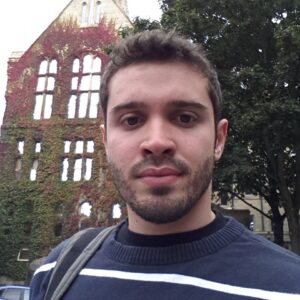Leopoldo Machado- A PhD student from Brazil
International student profiles 7 February 2019
Leopoldo Machado is a third year PhD student from Belo Horizonte, Brazil. Dr Neil Dixon is supervising his PhD project “Development and application of whole-cell biosensors for lignin valorisation.”
Please give a brief summary of your PhD project.
Whole-cell biosensors (WCB) are cell-based systems able to detect small molecules leading to a signal that can be quantified, with applications to several fields. Lignin is one of the components of the plant biomass, and an important feedstock for the substitution of fossil sources in the production of high-value chemicals. In my project, I’m developing bacterial based whole-cell biosensors that can detect chemicals involved in different stages of the lignin bioprocess. Those include lignin’s degradation monomers, pathway degradation sub-products and high value products. The WCB developed can be applied on the screening of new enzymes, directed evolution methods and dynamic regulation of metabolic pathways, improving the lignin valorisation field.
What did you do before undertaking your PhD?
In my previous studies, I finished my undergraduate degree with a Bachelor in Pharmacy and concluded my Masters in Pharmaceutical Sciences at the Federal University of Minas Gerais, in Brazil. During part of my undergrad and Masters, I participated in a project working on the development of a modified non-virulent parasite strain as an alternative vaccine for Leishmaniasis disease.
Why did you decide to undertake a postgraduate course?
After the initial research experience on the undergrad and Masters I wanted to expand my knowledge, have experience in other fields and improve my research skills. The opportunity to be involved in a full time research project in Biotechnology and Synthetic Biology was a great motivation.
Why did you choose your degree/project/supervisor?
The PhD project with the supervision of Dr Neil Dixon was an opportunity to study in a world leading science environment. The project was also involved in a collaboration with Brazilian research centres, helping with networking between the countries. The Dixon Lab is fully equipped and the projects are all at a high level. The PhD is allowing training and learning of new concepts in Biotechnology and Synthetic Biology, especially molecular engineering and biosensing.
Why did you choose Manchester?
Manchester is an amazing place to live and to study. The city is very multicultural, has a huge number of international students and is surrounded by recognized universities. The University of Manchester is one of the top universities in the world; it has been the house of very important scientists and discoveries throughout history. It counts with impressive facilities and technology areas, making it an excellent university to conduct a PhD.
What does the University offer international students?
The University gives a lot of support to international students. This includes information and advice during the initial stages of the PhD, and constant support throughout the studies. There are also many international societies and events happening during the year.



Leave a Reply